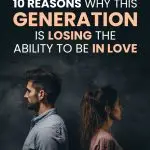The ability to fall in love is a timeless concept, yet recent observations suggest that today's generation may struggle to maintain deep, romantic connections.
Rapid technological advancements and shifting cultural norms are frequently cited as the potential culprits behind this social phenomenon.
They have introduced new communication platforms that transform how relationships are formed and sustained, often emphasizing convenience over depth.
Young adults today face economic pressures and evolving expectations about work, life, and success, potentially leaving less room for romantic love.
1. Over-Reliance on Technology for Communication
In today's society, many individuals rely heavily on technology to foster personal connections.
Instant messaging, social media platforms, and email have replaced face-to-face interactions and voice calls.
Texting has become particularly dominant, with emoticons and gifs often standing in for physical expressions of emotion.
- Instant Messaging: Quick and brief exchanges that lack depth.
- Social Media: Curated profiles that may not accurately portray a person’s true self.
- Email: Formal and often delayed responses that stifle spontaneous conversation.
This shift towards digital dialogue can lead to misinterpretations and a lack of genuine connection.
Interpreting human emotion through a screen is challenging. Understanding our partners can be difficult without body language or tone of voice.
As a result, the depth of relationships may suffer, with individuals feeling disconnected despite being ‘connected' online.
2. Fear of Commitment in Fast-Paced Society
Many individuals hesitate to commit to long-term relationships in today's fast-paced society.
The abundance of choices, career paths, and dating apps creates a paradox. Fear of missing out on better opportunities causes reluctance to settle down.
- Career Priorities: People prioritize career advancement, often believing that relationships may impede their professional growth.
- Social Media Influence: Constant exposure to others' highlight reels incites doubts about one’s own relationship satisfaction.
Adjusting to rapid changes in society and personal life can induce stress, deterring individuals from adding the perceived burden of a long-term commitment.
Their aversion to limitation drives them to seek flexibility, even in romance, leading to a pattern of transient connections rather than enduring bonds.
3. Idealizing Perfection from Social Media Influences

Social media platforms bombard users with images and narratives of perfect lives, relationships, and aesthetics. Constant exposure to such content sets unrealistic expectations for one's own love life. They witness a daily stream of:
- Idealized relationships where couples only showcase their happiest moments.
- Flawless appearances often involve filters or editing, creating standards that are unattainable.
- Grand romantic gestures seem to be the norm rather than the exception.
These portrayals can lead to a belief that real relationships should be devoid of issues.
People tend to compare their own lives to the highlight reels they see online and may feel their relationships are lacking if they do not measure up to what they perceive as ‘perfect'.
Consequently, they may dismiss genuine connections because they're not as picturesque as those seen on screen.
This quest for perfection can lead to discontentment and a devaluation of real-life relationships.
4. Decline in Face-to-Face Interactions
In recent years, face-to-face interactions have seen a significant decline among individuals, particularly in younger generations.
The surge of digital communication platforms such as social media, messaging apps, and video chatting services has altered the way people connect.
Key Factors:
- Preference for Digital Communication: People tend to choose texting or chatting over meeting in person.
- Busy Lifestyles: Modern life often leaves little room for leisurely meetings.
- Comfort with Online Spaces: Many find it easier to express themselves behind screens.
This shift has implications for emotional development and the building of meaningful relationships.
Without the nuances of in-person exchanges, such as body language and tone, misunderstandings can occur, affecting one's ability to forge deep connections.
Therefore, this generation may struggle with being in love, as forming strong emotional bonds is more challenging with less face-to-face interaction.
5. Increasing Career Focus Over Personal Relationships

In today's fast-paced world, individuals are increasingly prioritizing career ambitions over personal relationships.
The quest for professional success often demands long work hours and dedication that can overshadow the time and effort needed to build and maintain romantic connections.
| Pros of Career Focus | Impact on Relationships |
|---|---|
| Financial stability | Less time for partners |
| Personal achievement | Delayed family planning |
| Job satisfaction | Emotional distance |
Young professionals, in particular, are finding themselves in a vortex of career-driven lifestyles where climbing the corporate ladder becomes a dominant goal.
Networking events can sometimes take precedence over romantic dates, and work deadlines often come before intimate moments.
Personal relationships may take a back seat as the lure of success, recognition, and financial security become central.
Couples might struggle to synchronize their schedules, leading to communication gaps.
In a world where building a career is often seen as the foremost objective, the art of nurturing love faces challenges, with growing priorities towards personal achievements and professional growth paths.
Related post: Find out which professions resonate with your timeless spirit. Explore the best careers for old souls.
6. Higher Expectations and Lower Tolerance for Imperfections
In contemporary society, many individuals seek an ideal partner, often influenced by media portrayals of perfect relationships. This quest for an ideal match means expectations are sky-high.
- Key Expectations:
- Career success
- Physical attractiveness
- Social status
- Shared interests
When these expectations are not met, tolerance levels drastically drop. Imperfections that once might have been seen as endearing or workable, are now often deal-breakers.
These patterns indicate a shift in relational dynamics, with the following consequences:
- Less patience in getting to know someone
- Quick to judge, leading to premature relationship termination
- Increased disposable attitude towards partners
The result is a growing difficulty in forming deep, lasting connections, as people are quick to move on in search of the elusive ‘perfect' partner.
7. Rise of Casual Dating Culture
It's evident that today's social landscape has been transformed by the rise of casual dating culture, influencing how individuals approach relationships.
With the advent of dating apps like Tinder and Bumble, finding a date has become as simple as swiping right on a smartphone.
Key Features:
- Ease of Access: Dating apps provide a plethora of options, emphasizing quantity over quality.
- Non-committal Interactions: There's less pressure to pursue serious relationships.
- Changing Perspectives: Many people now prioritize personal growth and career over settling down.
Casual dating has redefined romantic expectations, making long-term commitments a secondary concern for some.
Despite the simplicity and convenience this culture brings, it also poses challenges for those seeking deeper, lasting connections.
8. Lack of Emotional Vulnerability

In today's society, many individuals struggle with being emotionally open. They often fear judgment or rejection, leading them to build walls around their feelings.
Emotional vulnerability is crucial in forming deep, meaningful connections, yet it has become increasingly scarce.
- Communication: People tend to communicate superficially, avoiding the risk of exposing their true selves.
- Social Media: Platforms can create a facade of perfection, discouraging genuine emotional expression.
- Fast-Paced Life: The rapid pace leaves little room for individuals to process and share complex emotions.
This defense mechanism protects from immediate discomfort but hinders the development of love, which thrives on emotional intimacy.
Recommended post: Explore the profound impact of personal interaction and find out why your presence is a gift.
9. Financial Insecurities Impacting Relationship Choices
Financial insecurities play a crucial role in shaping contemporary relationship dynamics.
Rising living costs and uncertain economic climates pressure individuals, steering their focus toward financial stability rather than romantic endeavors.
- Prioritization: Economic strain causes individuals to prioritize work and financial goals, leaving less room for pursuing or maintaining relationships.
- Stress: The burden of financial distress often leads to stress which can erode the foundation of a relationship.
- Commitment: Concerns about financial readiness can delay milestones like marriage or cohabitation.
They are finding themselves evaluating potential partners through the lens of economic viability, which can overshadow emotional compatibility.
This shift towards financial pragmatism reflects the changing tides of what it means to be in love to this generation.
10. Changing Perceptions of Love and Romance
In contemporary society, individuals often observe a shift in how love and romance are perceived.
Social media and dating apps have redefined the courtship process, emphasizing swiftness over depth. Bullet points below highlight key changes:
- Instant Gratification: There's a growing expectation for immediate emotional fulfillment.
- Overwhelming Choices: Endless profiles to swipe through can lead to the paradox of choice.
- Romantic Idealization: Media's portrayal of perfect relationships sets unrealistic expectations.
These factors contribute to a lack of patience in nurturing long-term relationships. Moreover, the nuanced emotions and efforts required to maintain love seem to diminish in value.
They manage connections via texts and emojis rather than through more substantial, in-person conversations, potentially leading to a superficial understanding of romance.
Hence, navigation through the landscape of modern love has become a more complex and less intuitive affair for many.
I like to write about my experiences on the metaphysical. My core passion though is helping people use the law of attraction to manifest wonderful lives of happiness and abundance. ❤️


